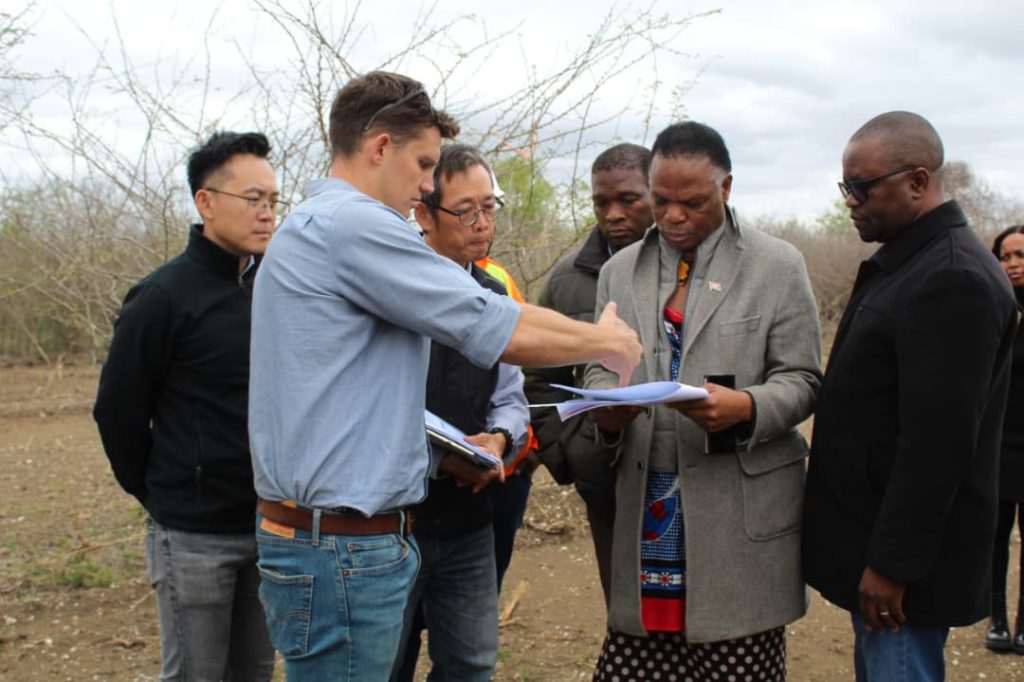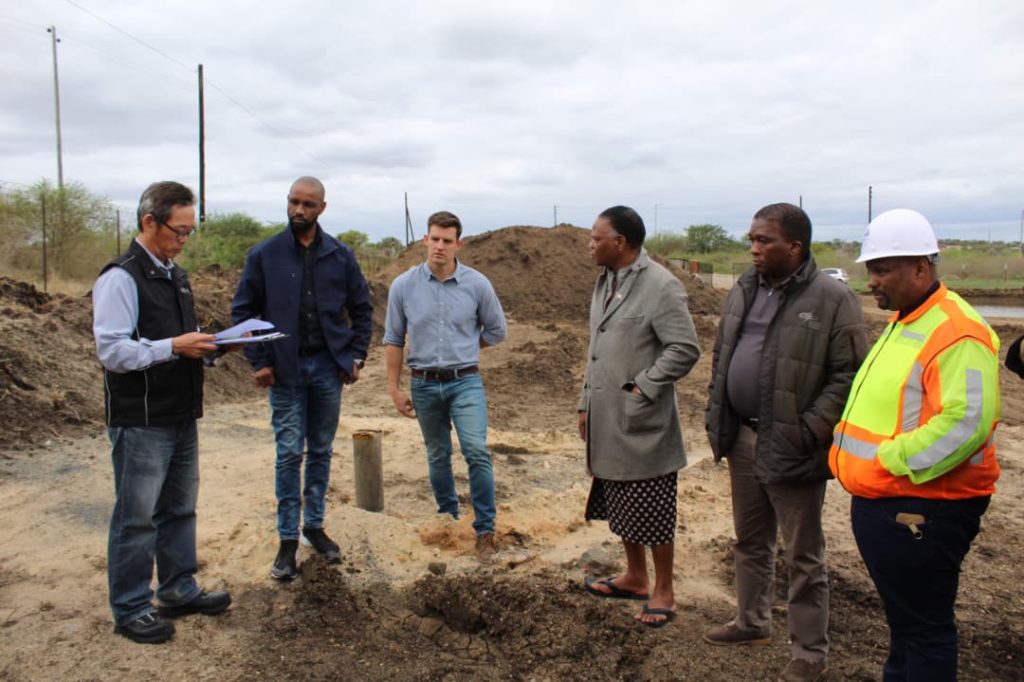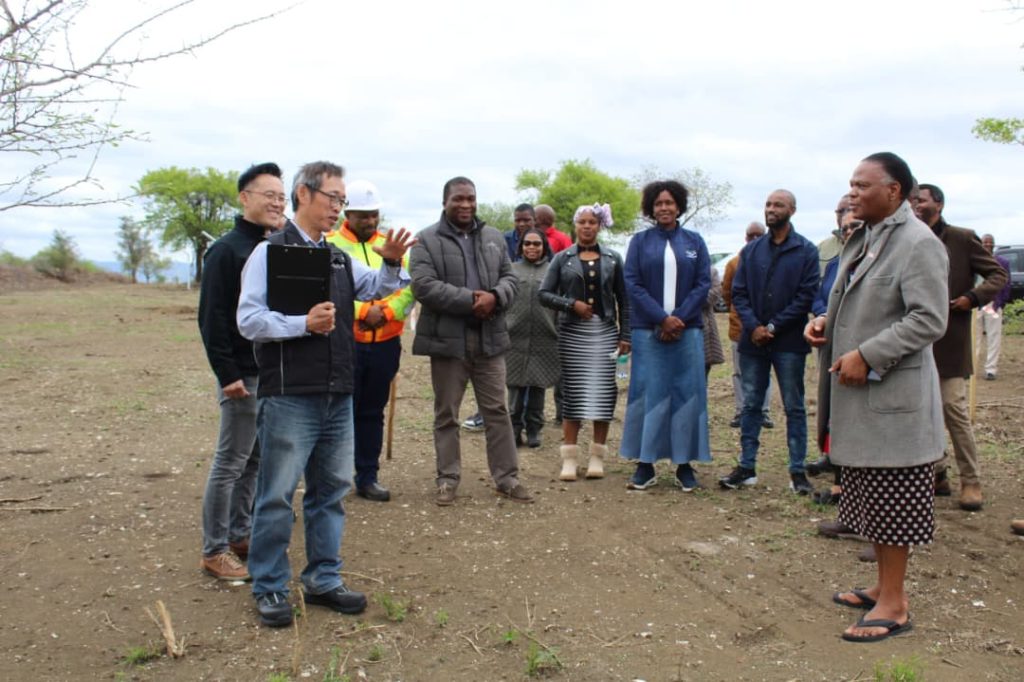
Special Report
The construction of the Strategic Fuel Reserve Facility (SFRF) at Phuzamoya is progressing very well, with construction works reported to be on schedule.
High-Level Delegation
The Minister of Natural Resources and Energy, Hon. Prince Lonkhokhela, led a high-level delegation to the Strategic Fuel Reserve Facility site on Friday, 3rd October 2025, to assess progress on the construction of the Strategic Fuel Reserve Facility. The delegation included Hon. Madala Mhlanga (Chairperson of the Portfolio Committee of the Ministry of Natural Resources and Energy in the House of Assembly), Hon. Senator Siphelele Mkhonta (Chairperson of the Portfolio Committee of the Ministry of Natural Resources and Energy in the House of Senate), Siphofaneni Member of Parliament, together with the Siphofaneni Indvuna yeNkhundla and the kaMkhweli community leadership.
Present from the Ministry of Natural Resources and Energy was the Principal Secretary, together with Ministry officials. The delegation also included the Board and Management of the Eswatini National Petroleum Company (ENPC). The delegation was met by officials from the contractor (Overseas Electric Engineering Corporation – OEE) together with those from CECI, who are the project managers, who briefed the Minister on the progress made.
Project Progress
The project team, which comprises the contractor (OEE) and project managers (CECI), led the delegation through a tour of the ongoing construction in order for the Minister and stakeholders to get a first-hand appreciation of the progress made to date. The contractor reported good and commendable progress on the initial 3-month programme of the project, which commenced in mid-August 2025. It was reported by the contractor that the 3-month scope includes construction site clearance, excavation, site fencing, and construction of site offices, including ablution facilities, borehole drilling, and electrical reticulation.
During the session, the project team reported that the initial 3-month programme progress was at 31% and assured the Minister that the works remain on track for completion by mid-November 2025, after which the next phase of the construction project will commence. The contractor reported that to date, the site clearance had been completed and that some excavation had already been done. In addition, the contractor reported that borehole drilling had been completed and that a geotechnical survey and soil tests, which had already been done, revealed that the sub-soil was ideal for the construction of the platforms where the depot would sit. OEE further stated that the work which was already underway is part of a 36-month programme of the construction of the facility, hence it was of utmost importance to ensure that timelines were adhered to avoid time overruns, especially for activities that are on the construction critical path.
The project team also stated that local participation in the project was of paramount importance following engagements made with the client, ENPC, and the Construction Industry Council (CIC). To that end, the contractor reported that the work that had already been done on site was subcontracted to local companies.
Minister’s Words and Appreciation
Speaking at the site, after conducting a tour of the ongoing works, the Hon. Minister expressed his appreciation for the evident work that had already been done on site, which includes the completion of the site clearance and some excavation. He also appreciated that the actual portion of the farm where the Strategic Fuel Reserve Facility will sit is already being fenced and that a borehole, which will supply water during construction, had already been drilled and with the preliminary tests showing a good yield.
Local Participation

The Minister also appreciated that the work that had already been done was given to local subcontractors by the main contractor, OEE. The Minister further emphasised the importance of job creation and skills transfer for EmaSwati. He emphasized that it was important for the project team and ENPC to ensure that local participation on the project was at least at 30% as this is the minimum expectation from key stakeholders.
During his remarks, the Minister even cited the South Korea development example, whereby the Government of that country enacted a law to foster the involvement of locals for projects that required skills that were not available in that country; the law compelled the foreign firms to partner with local citizens, which helped to ensure skills transfer. The Minister further stated that he desired that for aspects of the project where we do not have the required skills locally, the foreign firm that will be hired is expected to partner with a local entity.
“This project must not only deliver world-class infrastructure but also uplift the people of Eswatini. Local employment, skills transfer, and fair treatment of workers is expected. Every liSwati employed here should benefit through decent pay”. The Hon. Minister stated that it was of paramount importance for opportunities to be availed to qualifying locals and subcontractors.
The Minister emphasized the meaningful participation of the local community of KaMkhweli, Siphofaneni, and the country at large, which will lead towards economic upliftment, as the country is in great need of jobs to reduce the level of unemployment. The Minister, however, sent a word of caution that it was important to ensure that local participation would not compromise project progress. As such, all Emaswati who would be given opportunities to participate in the project were expected to do so efficiently, and poor performance would not be tolerated. The Minister stressed, “We cannot, just because a truck belongs to a LiSwati, then allow situations whereby a truck takes up to 6 hours to deliver material that would normally take a couple of hours to complete. Efficiency is key”.
The contractor committed to ensuring that local participation is realized, and they confirmed that efforts are underway to engage local contractors and communities in the project. The contractor representative further stated that, “Through the project, workers will acquire recognised qualifications in areas such as welding, metalwork, and other trades, which will help them to be better positioned for other employment opportunities, while also building skills that can serve them in future projects.”
Project Economic Impact
The Strategic Fuel Reserve Facility is a national priority project aimed at ensuring fuel supply security and strengthening the country’s energy security. It is expected that at least 30% of the project scope will be availed to Emaswati either for subcontracting, jobs, or the supply of machinery and materials.
When making his remarks, the Hon. Madala Mhlanga stated that following the extensive work that had been done leading to the passing of the Loan Act, the project needed to be delivered on time and within budget and he also stated that he had personally heard from the contractor that there were no sub-soil issues based on the tests already done as such no variations would be tolerated.
The Minister also requested the contractor to develop and implement a Corporate Social Responsibility policy that would benefit the local community and the country at large. In addition, for a seamless execution of the construction project, the Minister advised the project team to respect the local leadership and the community at large.

Also commenting on the site visit, the ENPC Board Chairperson, Mr Velaphi Dlamini, expressed confidence in the progress achieved to date;
“This is a facility the country has waited for many years. We are encouraged by the progress we have witnessed and remain confident that the project will be delivered on time, within budget, and to the highest international standards.”
ENPC, in partnership with the Ministry of Natural Resources and Energy, reiterated its commitment to ongoing community engagement and empowerment, ensuring that the project delivers lasting value to Phuzamoya, the Siphofaneni Inkhundla, and the nation at large.
About the Strategic Fuel Reserve Facility
The SFRF is being constructed to create capacity for the Government, through the Ministry of Natural Resources and Energy (MNRE), to store strategic fuel stocks, in order to ensure that the country never runs dry on fuel supply. The construction of the SFRF and management of the strategic fuel stocks is the responsibility of Eswatini National Petroleum Company, which is a parastatal under MNRE. Upon completion, the SFRF will have fuel storage tanks with a total capacity of 80 million litres (40 million litres for unleaded petrol and 40 million litres for diesel), which can last the country for at least 60 days in the event of supply chain disruptions. The facility will also be equipped with an ethanol blending facility, where unleaded petrol will be blended with ethanol, in order to reduce carbon emissions in unleaded petrol.
